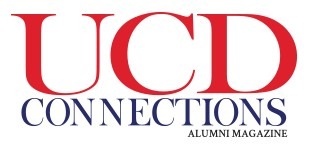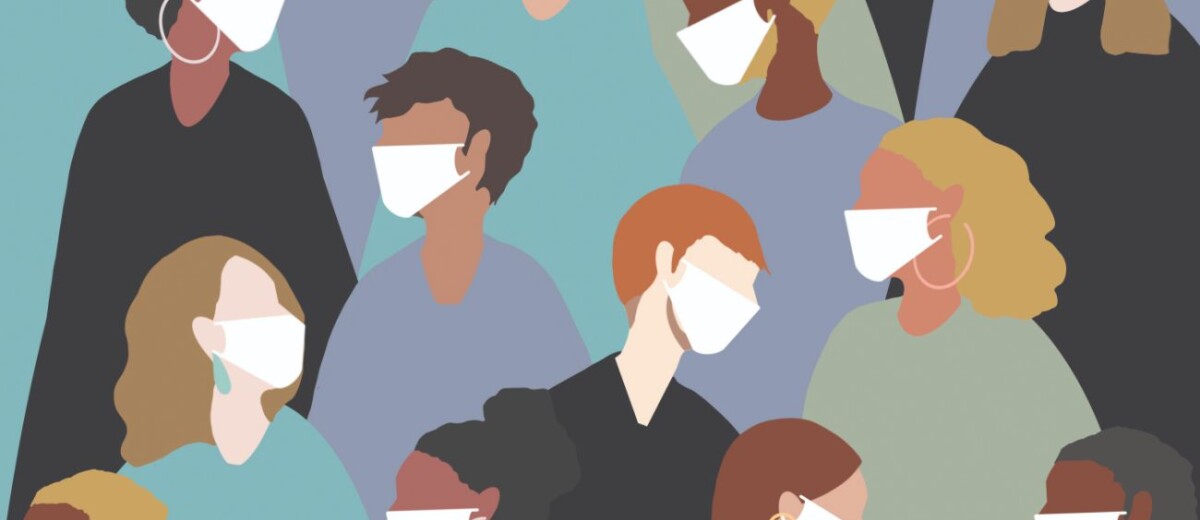SIXTEEN UCD RESEARCH projects were granted funding under Government rapid response funding calls. From screening for antivirals against SARS- CoV-2 (the strain of coronavirus that causes Covid-19 disease) to monitoring sewage, each project aims to quickly increase our understanding, improve diagnostics, treatments and equipment, mitigate and recover from the impact of Covid-19, and to enhance our readiness and resilience for future resurgences of the virus or other public health emergencies.
1. Repurposing Drugs
Dr Virginie Gautier, in collaboration with Professor Paddy Mallon, both UCD School of Medicine and UCD Centre for Experimental Pathogen Host Research (CEPHR), won funding from the Health Research Board and Irish Research Council (HRB-IRC) to explore effective antiviral compounds and to accelerate the development of Covid-19 treatments. The team is screening drugs for their capacity to inhibit SARS-CoV-2 and identify compounds to be included in novel therapeutic interventions to be tested in randomised controlled clinical trials. Their drug discovery strategy is based on drug repurposing of medicines already approved for clinical use.
2. North Dublin Study
The Covid-19 pandemic has impacted health and social care in Ireland, especially in inner city Dublin. Clinical Professor John Lambert from UCD School of Medicine and an Infectious Diseases consultant at Mater Misericordiae University Hospital, leads an expert team, funded by HRB-IRC, to determine characteristics and outcomes of covid patients at the Infectious Diseases Department in the Mater. The research will inform health service policies to counteract the adverse impacts of the Covid-19 pandemic on population health and will involve a collaboration with Ireland’s HSE Clinical Programmes, Health Protection Surveillance Centre, and the EU’s CHAFEA and ECDC.
3. Paediatric Emergency
Lead researchers Dr Emma Nicholson and Dr Thérèse McDonnell from UCD Centre for Interdisciplinary Research Education and Innovation in Health Systems (IRIS) initiated their HRB-IRC study following concerns raised by the Irish Medical Organisation that lockdown measures may result in avoidance of emergency departments (EDs) for non-Covid related illness. The Cupid Covid-19 project assesses the impact of the crisis on care- seeking behaviour of parents to identify how barriers to accessing care can be removed. Their national parents survey found some parents were hesitant about using healthcare services for their children during lockdown and some avoided accessing necessary healthcare.
4. Vulnerable Individuals
Associate Professor Christine Linehan from UCD Centre for Disability Studies and an interdisciplinary team gained HRB-IRC funding to examine the impact of Covid-19 on those with intellectual and developmental disabilities (IDD) who may experience significant and disproportionate distress during a pandemic. Among many disparities with the general population, individuals with IDD are more likely to experience communication difficulties, co-morbid physical and mental health conditions, and inequities in healthcare access and health promotion. Results of the study will be shared with families, service providers, national and international stakeholders such as the WHO, the Fundamental Rights Agency and the European Association of Service Providers for Persons with Disabilities.
5. Digital Manufacturing
Director and deputy director of I-Form, SFI Research Centre for Advanced Manufacturing, Professor Denis Dowling from UCD and Professor Dermot Brabazon from DCU have created a Covid-19 Digital Manufacturing and Innovation Hub for the design, manufacture and delivery of PPE (personal protective equipment) for frontline medical staff in hospitals and other healthcare settings. The focus is particularly on the use of 3D printing to fabricate polymeric PPE parts including visors, door openers, ventilator and face protector parts.
6. Detecting Resurgence
Head of UCD School of Biomolecular and Biomedical Science, Professor Wim Meijer leads a team from veterinary medicine, civil engineering and biomolecular and biomedical science in an environmental monitoring project that aims to detect resurgence of the virus in the population. The presence of SARS-CoV-2 in sewage entering wastewater treatment plants is an indication of how many people are infected and can serve as an early warning system for a new wave of Covid-19. The SFI-funded project also aims to work out what happens to the SARS-CoV-2 virus in nearby bodies of water such as rivers, streams and sea in the Dublin Bay area.
7. Gold Standard Testing
Another UCD project focuses on developing and supplying necessary reagents and materials for SARS-CoV-2 testing for hospitals in the Ireland East Hospital Group. The project is led by a multi-disciplinary team including infectious disease clinician Professor Paddy Mallon and molecular virologist Dr Virginie Gautier from UCD School of Medicine, and nanotechnologist Professor Gil Lee from UCD School of Chemistry. Using test samples from patients enrolled in the All-Ireland Infectious Diseases Cohort, the team tests and makes key reagents to ensure supply of vital materials to detect virus RNA – including a local source of nanoparticles, buffers and advanced magnet separation devices, to support the Irish healthcare system.
8. Blood Clotting In Covid
Led by Consultant Haematologist Dr Barry Kevane from the Mater Hospital and UCD Conway Institute of Biomolecular and Biomedical Research, the ‘Cocoon Study’ (Covid-19 coagulopathy and thrombosis: novel prognostic and therapeutic opportunities) is an international project examining blood coagulation in Covid-19 patients and its interplay with inflammation. The study aims to address urgent clinical dilemmas and to develop novel solutions for existing diagnostic and therapeutic challenges. Using advanced Artificial Intelligence and Genomics technologies, the project will deliver enhanced thrombotic prevention strategies and a rapid diagnostic platform for personalised risk assessment.
9. Examining Antibodies
Led by Professor Paddy Mallon, this collaboration between UCD CEPHR and UCD Clinical Research Centre looks at the detection and quantification of neutralising antibodies against Covid-19 infection. As of yet, it is unclear if infection with the SARS-CoV-2 virus confers post-infectious immunity, so determining if it does will open opportunities in both treatment and prevention that could have global impact. The team will address the data gaps by examining a large population of recovered individuals.
10. Computational Models
Professor Gregory O’Hare from UCD School of Computer Science leads an interdisciplinary team in the project ‘COMBAT’ (Covid-19 Modelling through agent-BAsed Techniques). Understanding the spread and propagation of Covid-19 is critical in order to inform Government policy and elevate public compliance with national regulations. The project is developing models that offer guidance regarding the transmission of SARS- CoV-2, the effect of containment measures, duration and relaxation of such measures, multiple waves/multiple lockdowns, vaccine rollout and controlled sectoral and/or geographic return to work and school. COMBAT will provide a world-first, population-scale Agent-based Modelling (ABM) Covid-19 model which not only characterises the disease but also the environment within which the disease exists – modelling societal, geographical and socio-economic dimensions.
11. Nanomaterials
Professor Dermot Brougham, assisted by Associate Professor Susan Quinn, both from UCD School of Chemistry, is leading a team to investigate ‘Next Generation Magnetic Beads for enhanced viral RNA detection and improved Covid-19 Testing, Securing Supply and Improving Performance.’ Silica-coated magnetic iron-oxide beads are an established component of Covid-19 testing kits and are an industry standard for RNA-based diagnostics. They are purchased on the open market and subject to supply chain issues. Professor Brougham’s team aim to improve the RNA extraction efficiency of magnetic beads, and solve the supply issue, through a focused synthetic nanomaterials project supported by Dr Virginie Gautier from UCD CEPHR.
12. Anti-Covid Plastic
Professor Michael Gilchrist and Dr Nan Zhang from UCD School of Mechanical and Materials Engineering are developing plastic packaging and film resistant to Covid-19, in collaboration with Dr Jaythoon Hassan (NVRL), Dr Nicola Fletcher (UCD School of Veterinary Medicine) and industry partners. A study found viable coronavirus particles were still detected on plastic surfaces up to three days after contact. Developing coronavirus-resistant forms of PE and other important plastic films would significantly reduce a major source for the risk of community infections. The project aims to develop a unique form of flexible textured plastic film that will ensure coronavirus does not remain viable for more than 60 minutes.
13. Remote Monitoring
Professor Eilish McAuliffe from UCD IRIS Centre and School of Nursing, Midwifery and Health Systems leads an interdisciplinary consortium looking at ‘Expanding Care Capacity through Remote Monitoring of Covid-19 Patients’. The research focuses on two Covid-19 care models: (1) The Mater’s virtual clinic where patients submitted ‘self-monitoring’ data using the HSE’s Covid-19 App (developed by Irish digital health firm patientMpower); (2) HSE Mid-West’s Community Assessment Hubs to allow symptomatic patients rapidly access health expertise whilst reducing pressure on GP clinics. The project aims to gather evidence about the experiences of patients and healthcare staff and learn how not just Covid-19 patients but other patient groups could effectively manage their symptoms at home.
14. Monitoring Respiration
Biomedical engineers at UCD, Professor Madeleine Lowery and Dr Emer Doheny are developing a system to remotely monitor respiratory rate, using smartphone microphones to record patients’ breathing, and predictive models of hospital admissions. Once developed, the new system will integrate with the existing Covid-19 App and will enable better management of self-isolating patients and prioritisation of hospital admissions.
15. Safe Intubation
Professor of Anatomy in UCD School of Medicine, James FX Jones formed an interdisciplinary cohort, including Clinical Professor and Consultant Anaesthetist Conan McCaul and Professor Denis Dowling (I-Form, UCD School of Mechanical and Materials Engineering) to manufacture novel Covid-19 laryngoscopes for airway intubation. Owing to the proximity of the anaesthetist to the infected airway of the patient, intubation is one of the highest risk procedures in managing Covid-19 patients. The project team is exploring the manufacture of a cheap, disposable, 3D printed video-laryngoscope customised for Covid-19 patients. The device will incorporate novel features which protect the user and keep the patient well oxygenated.
16. Safer Ppe Surfaces
There is still little information on the role of surface properties in the SARS-CoV-2 virus’ ability to survive on surfaces, especially PPE surfaces. Addressing this, postdoctoral researcher Emmanuel Ekoi from UCD School of Mechanical and Materials Engineering and co-leads Professor Denis Dowling, Professor Aoife Gowen from UCD School of Biosystems and Food Engineering, and Dr Virginie Gautier are investigating surface topology and the spread of Covid-19 disease – with the specific aim of identifying superior PPE surfaces to help reduce infection of frontline healthcare workers. The team anticipates that the identified PPE surfaces will be capable of reducing the virus’ life span and/or killing it upon contact.

